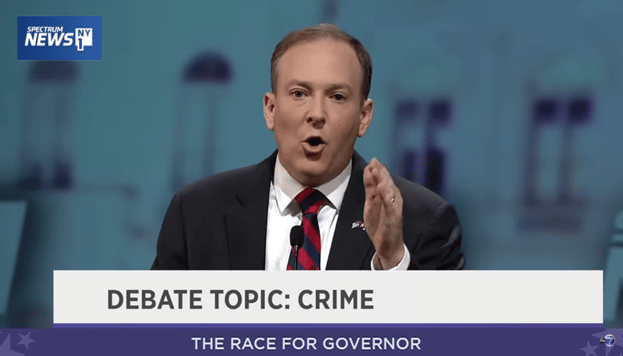Oct. 27, 2022
Permission to republish original opeds and cartoons granted.
Zeldin promises to make New York’s ‘streets safe again’ as violent crime up 3.7 percent in state since 2018
By Robert Romano
“This is about all of us together: Republicans, Democrats, Independents as New Yorkers to make sure our streets are safe again to make sure our subways are safe again.”
That was New York Republican gubernatorial nominee U.S. Rep. Lee Zeldin in his Oct. 25 debate against incumbent Democratic Gov. Kathie Hochul, raising crime as an issue in the governor’s race with election day on Nov. 8 fast approaching and promising to “take back our streets and to support unapologetically our men and women in law enforcement.”
Zeldin’s crimefighting campaign against Hochul comes amid a 3.7 increase in violent crimes in the state since 2018 reported via the FBI’s Uniform Crime Reporting (UCR) Program, as violent crimes increased from 350.8 per 100,000 to 363.8 in 2020.
Zeldin also blasted New York State’s cashless bail reforms, enacted in 2020, calling for it to be overhauled. And with good reason, as the state and city governments were unleashing a crime wave upon their own people.
According to a Times Union analysis of New York crime data, from July 2020 to June 2021, about 4 percent, or almost 3,500 of those 98,145 released under the law went on to commit violent crimes: “there were 3,460 cases in which adults were rearrested on violent felony charges, including 773 with a firearm.”
These included “cases in which adults were released after being charged with offenses for which judges previously could have set bail or ordered them held in custody.”
Even before the law’s implementation in 2020, New York state judges were letting criminals go in 2019, with 25,000 estimated to have been released beforehand according to PIX 11.
It’s only been two years since the law has gone into effect, and Zeldin warned that things would only get worse if the state continued on its path, declaring, “we can continue with the status quo where they believe they haven't passed enough pro-criminal laws or we could take control of our destiny and make sure law-abiding New Yorkers are in charge of our streets again.”
That’s not much of a choice, but restoring law and order might be one of the issues on New Yorkers’ minds when they go to vote in November.
The question is whether Zeldin can get enough votes from across party lines, in a state long dominated by one-party rule as Democrats possess about a 1 to 1 registered voter advantage against independents and Republicans combined, according to the New York State Board of Elections. To prevail, Zeldin would have to garner the vote of almost every single Republican and independent, and a lot of Democrats on top of that.
Or, New Yorkers might just vote for Hochul again, and they’ll just have to wait and see what the crime numbers are like in another four years as criminals keep getting set free, if nothing else, serving as a cautionary note for other states.
Robert Romano is the Vice President of Public Policy at Americans for Limited Government.
To view online: https://dailytorch.com/2022/10/zeldin-promises-to-make-new-yorks-streets-safe-again-as-violent-crime-up-3-7-percent-in-state-since-2018/

![]()
USA Today/Suffolk University poll: Republican support rises ahead of Election Day, with inflation driving voters
By Susan Page and Sarah Elbeshbishi
- Voters overwhelmingly view the election as a way to send a message to the White House.
- Biden's upbeat reassurances on the economy aren't breaking through with voters.
- Asked whether inflation or abortion mattered more to them, respondents chose inflation by 56%-40%.
Republicans are resurgent as the midterm campaign heads into its final stretch, an exclusive USA TODAY/Suffolk University Poll finds, amid angst about President Joe Biden's leadership and the nation's economy.
As Americans feel the bite of inflation in their daily lives, from eating out less often to canceling vacations, voters overwhelmingly view the election as a way to send a message to the White House – and by double digits, that message is to change course.
On a generic ballot, one naming parties but not individual candidates, those surveyed now support the Republican congressional candidate over the Democratic one by 49%-45%, a turnaround since the USA TODAY poll taken in July, when Democrats led 44%-40%. The findings stoke GOP hopes of gaining control of the House of Representatives in the Nov. 8 elections, and with that, new powers to confront the Democratic White House.
Democratic congressional candidates have held their support since the summer, ticking up 1 percentage point, but most of the 16% of voters who were undecided then have now made up their minds and moved to the GOP. As early voting is opening in many states, just 6% remain undecided.
The poll of 1,000 likely voters, taken by landline and cellphone Oct. 19-24, has a margin of error of plus or minus 3.1 percentage points. The July poll was of registered voters.
The generic ballot is an imperfect way to predict how the elections will turn out. But the trend lines have proved valuable in signaling which party is gaining ground and which one is losing it.
Economic gloom despite Biden's reassurances
Pessimism is running deep about the economy.
Biden's upbeat reassurances – that the job market remains strong and that a recession isn't inevitable – aren't breaking through with voters. Two-thirds of those surveyed, 66%, say the nation is already in a recession or a depression. Just 10% say it's in a recovery.
Sixty-one percent report that they are eating out less often; 50% have postponed or canceled vacations, 47% have cut back on groceries, 45% are driving less.
Hispanics have been hit particularly hard. Nearly 6 in 10 are foregoing vacations and driving less, and 44% say the economy is their top issue, more than either whites or Blacks.
The issue of inflation – and the feeling that the White House hasn't done enough to address it – is helping Republicans score significant inroads among Hispanic and Black voters, both demographic groups that Democrats have long relied on for support. Now 40% of Hispanics and 21% of Blacks are backing the Republican candidate.
To compare, Republican Donald Trump carried 12% of Blacks and 32% of Hispanics in the 2020 presidential election, according to network exit polls.
Huge gender gap on abortion
After the Supreme Court reversed the landmark Roe v. Wade decision in June, some Democratic strategists predicted opposition to the ruling that struck down abortion rights would disrupt other factors that typically determine midterms, including views of the economy and of the sitting president.
But the new poll shows much of midterm politics going back to basics. On a list of seven issues, 37% chose the economy/inflation as the most important issue determining their vote. Abortion, which ranks second, was cited by half that number, 18%.
Asked specifically whether inflation or abortion mattered more to them, those surveyed chose inflation by a double-digit margin, 56%-40%.
That said, the abortion issue continues to resonate with many women, and it is contributing to an enormous gender gap among independent voters. Independent women favor the Democratic candidate by 11 points, 51%-40%. Independent men support the Republican candidate by 22 points, 57%-35%.
"Had Roe v. Wade not been overturned, independent women may have voted for the GOP congressional candidate along with their male counterparts on strictly the issue of inflation and a wobbly economy," said David Paleologos, director of the Suffolk University Political Research Center. "Connecting the data points, independent women are venting their anger toward the Supreme Court by breaking with men and voting for the Democrat, despite the economy and other issues."
Message to Biden: Change course
Midterms are often seen as a referendum on the president, and most voters see this election as a way to send a message to Biden. Forty-three percent agree with the statement, "I want my vote to change the direction President Biden is leading the nation," while 28% say instead, "I want my vote to support the direction President Biden is leading the nation."
Just 25% say their vote "doesn't have much to do with President Biden and his policies."
Biden's job rating has improved since July, though it remains anemic. Now, 44% approve of the job he's doing as president; 53% disapprove. In July, it was 39%-56%.
His current standing with voters is almost the same as Donald Trump the month before the midterms during his presidency. In the USA TODAY/Suffolk Poll in October 2018, Trump's rating stood at 43%-54%.
In that election, Democrats gained 41 seats and took control of the House. Republicans gained two seats in the Senate, retaining control.
In this election, Republicans need a net gain of five seats to win control of the House and a net gain of a single seat to win control of the Senate.
To view online: https://www.usatoday.com/story/news/politics/2022/10/27/republicans-resurgent-economy-midterms/10596369002/


